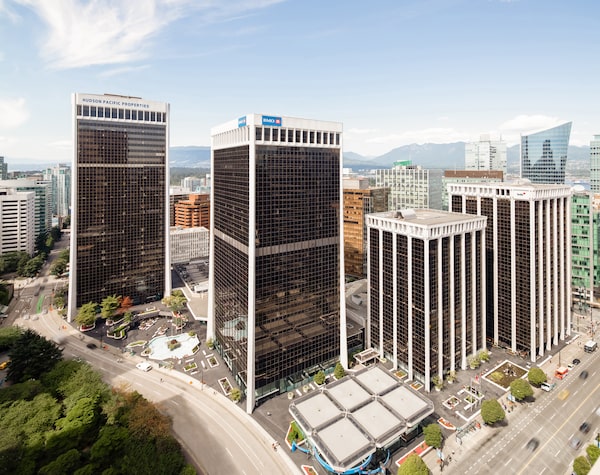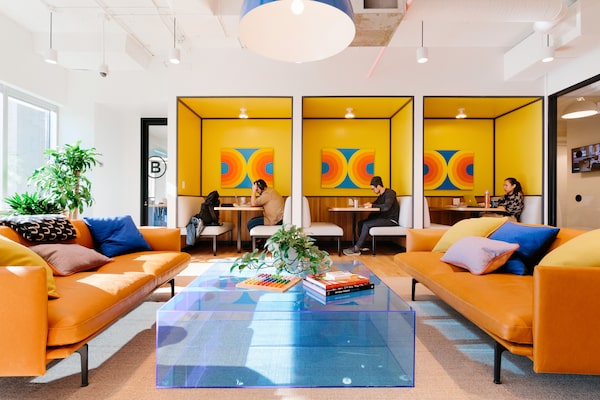
Shopify is taking over four floors of Vancouver's Bentall Centre.Supplied
Vancouver has attracted the attention of several major tech firms that want to tap into a growing technology sector, including small- to mid-size companies, property managers, investors and other spinoff services and businesses.
A few companies, such as Microsoft Corp. and Sony Pictures Imageworks Inc., are already settled in. By the end of the year, Shopify will have taken over four floors at the city’s Bentall Centre, which will draw about 1,000 workers to the downtown core.
And once Seattle-based Amazon.com Inc. moves into its proposed 1.1 million square feet of leased downtown office space, it will become the city’s largest corporate tenant, attracting thousands more employees.
The pressure is on Vancouver’s commercial real estate sector to prepare for the growth, particularly in the downtown area, where tech industries typically gravitate.
According to CBRE Group Inc., Vancouver’s downtown office space is expected to hit a record low vacancy rate of 1.7 per cent this year, down from 2.3 per cent in the fourth quarter of 2019.
A number of factors have made the city ripe for a major influx of jobs in the next few years, including American immigration policy that has closed doors to talented workers who would otherwise have gone stateside.
As well, educational institutions in British Columbia and Washington are churning out talent that is highly skilled in digital technology. Government funding and support programs in B.C. have also fostered a thriving industry.
Randall Lucas, an investor with Seattle-based venture capital firm Voyager Capital, had been checking out Vancouver since 2007, but it wasn’t until 2016 that he saw opportunities.
“In 2016 we decided the time was right to bet on Vancouver; now we hold [it] up alongside Portland and Seattle as one of the three main areas that we focus on,” Mr. Lucas says. “[The city] has come miles in those years since we were looking at it in 2007.
“This is a place that we are interested in sticking with for the long haul and making it a first-class part of our investing practice. It’s one of the three pillars of the Pacific Northwest.”
Another cost advantage driving the Vancouver tech sector is that the jobs are generally lower paying compared with American jobs. The average salary for a tech worker in Vancouver is $83,200, according to the BC Tech Association. In Seattle, a tech worker quite new to the field typically makes about US$130,000.
But those incomes will grow as the big companies continue to move into Vancouver with many positions to fill, thereby creating a highly competitive environment, Mr. Lucas says.
“You can expect an uptick in the salaries of developers in Vancouver as these large employers come in,” he explains.
The key to any tech industry is the ecosystem that develops. The presence of major companies helps build the overall ecosystem because then the startups can attract talent who will have other employment as a fallback, Mr. Lucas adds.
For example, employees may be more inclined to move to Vancouver to join a startup because even if it fails, they can find work with another one, or for a big company.
“It’s important for them to be able to rub shoulders and be in proximity to other startup people,” Mr. Lucas says.
While about 80 per cent of the startups he visits in Vancouver are located in or around the downtown core, he says that tech office clusters also need to form outside the pricey and slick office tower areas.
A case in point is the ecosystem that has formed out of older, low-scale buildings in Mount Pleasant, a former heavy industrial area on the east side of the city.
Andy Yan, director of the City Program at Simon Fraser University, says about 41 per cent of Metro Vancouver’s jobs in information and cultural industries (including tech) are concentrated in the city of Vancouver.
Around 10 per cent of workers are in urban areas of Burnaby and another 10 per cent in Surrey, he adds.
“High-tech companies have rediscovered the city as opposed to isolated office parks,” Mr. Yan says. “They want proximity and connectivity. It goes back to the concept of ‘agglomeration externalities,’ which is body heat.
“The idea is that when you put people together, particularly people with ideas and networks, they [will] innovate to build new products. They further economic development and, hopefully, create new companies.”

WeWork operates this co-working space at 333 Seymour.Supplied
U.S. company Hudson Pacific Properties purchased the four-building downtown Bentall Centre last year with an eye to growth throughout the region. The Bentall site also allows for a fifth tower, which made it a particularly attractive asset. Chuck We, Hudson Pacific’s senior vice-president for Western Canada, says the company has been repositioning Bentall, in large part to tap into the tech sector.
“We have hit a tipping point and have a lot of gravity now with the kinds of jobs that this talent is looking for,” Mr. We says.
He says Hudson Pacific can play a key role in helping other tech companies and businesses recruit and retain talent in a competitive job market by offering a more exciting work experience. The complex is already home to several tech companies, and last fall rideshare company Lyft moved its 20 employees into the Bentall Centre.
Hudson Pacific is updating public areas, looking into locally sourced food in the food courts and offering outdoor events in the summer.
The new strategy has already paid off: The Shopify deal was a result of its repositioning effort. Mr. We says he has been getting calls from tech companies in West Coast U.S. cities that now see Vancouver as an alternative market.
Co-working company WeWork aims to provide central office space for startups that would otherwise be priced out of the market. Although the market is tight, the company will have 10 spaces open in the region by end of the year.
Stephen Tapp, vice-president for WeWork Canada, says the company has been strategic as it moves into Metro Vancouver. “We have essentially been full since we started because that demand is there.”